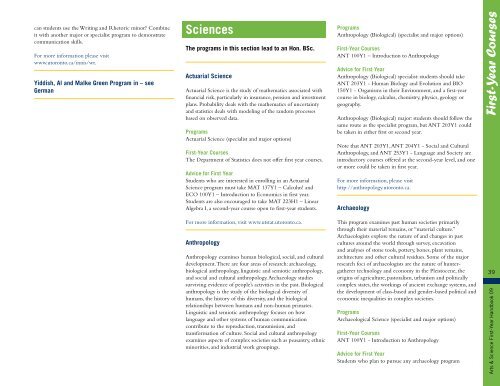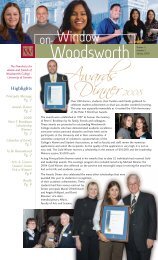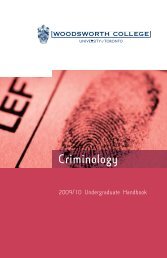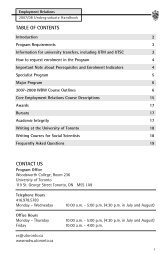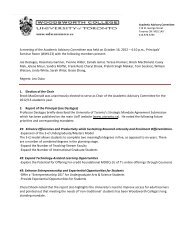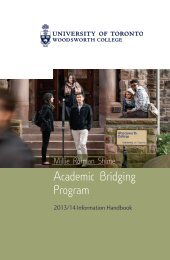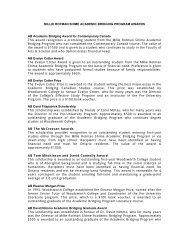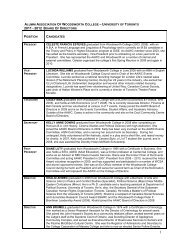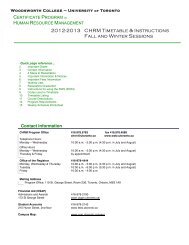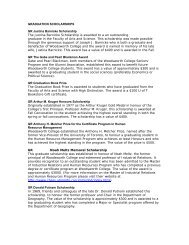and course choice in higher years. Introductory languagescourses, including Bengali, Tamil and Hindi, are <strong>of</strong>fered at thesecond-year level but are open to first-year students.For more information please visitwww.newcollege.utoronto.ca/programs/southasia.htm.Spanish and PortugueseSpanish and Portuguese are among the world’s most widelyspoken languages. They share a Latin origin, and throughtheir histories and current uses they intersect with diversecultures in Europe, the Americas, Africa and Asia. In additionto instruction in the Spanish and Portuguese languages, ourprograms explore the literatures and cultures <strong>of</strong> the Hispanicand Lusophone worlds. The study <strong>of</strong> Hispanic linguistics <strong>of</strong>fersspecial focus on the structure and diversity <strong>of</strong> the Spanishlanguage.ProgramsSpanish (specialist, major and minor options)Portuguese (specialist, major and minor options)<strong>First</strong>-<strong>Year</strong> coursesSPA <strong>10</strong>0Y1 - Spanish for Beginners PRT <strong>10</strong>0Y1 - BeginnersPortuguese PRT 1<strong>10</strong>Y1 - Elementary Portuguese (forstudents who speak Portuguese but have not studied thelanguage formally)Advice for <strong>First</strong> <strong>Year</strong>Introductory courses in Spanish and Portuguese are availablefor first year students with no prior knowledge <strong>of</strong> thelanguages. Students with Grade 12 Spanish should enrol inSPA 220Y1. Students with other additional experience inSpanish should take the online placement test available onthe Blackboard portal. Students with previous experience<strong>of</strong> Portuguese should consult with the Associate Chair forPortuguese.For more information please visitwww.spanport.utoronto.ca/undergraduate.Ukrainian – see Slavic Languages and LiteraturesUrban StudiesIf cities fascinate you and you want some hands-onexperience included in your course credits, the urban studiesprogram is for you. This is a small program that gives studentsthe opportunity to learn by doing. Our graduates have goneon to a variety <strong>of</strong> careers in such areas as planning, publicrelations, law, politics, real estate and community development.ProgramsUrban Studies (specialist, major and minor options)Sociology and Urban Studies (specialist)<strong>First</strong>-<strong>Year</strong> CoursesThe Urban Studies Program does not <strong>of</strong>fer any courses at thefirst-year level.Advice for <strong>First</strong> <strong>Year</strong>If you are interested in urban studies then you should takeat least one introductory, social science course in geography,economics, political science, or sociology in your first year.For more information please visitwww.utoronto.ca/innis/urban.Visual StudiesVisual Studies is a stream in the Department <strong>of</strong> Art that <strong>of</strong>ferscourses in most areas <strong>of</strong> contemporary art practice, includingdiscipline specific and interdisciplinary studios. Visual Studiesemphasizes a strong commitment to the social, cultural andtheoretical issues embodied in the current art community.ProgramsVisual Studies (specialist, major and minor options)<strong>First</strong>-<strong>Year</strong> coursesVIS 120H1- Visual ConceptsVIS 130H1 - Visual StrategiesAdvice for <strong>First</strong> <strong>Year</strong>Students interested in Visual Studies programs should enrol inVIS 120H1 and VIS 130H1. Students who wish to pursue thespecialist option should also take FAH <strong>10</strong>2H1 – The Practice<strong>of</strong> Art History.For more information please visit www.art.utoronto.caWoman and Gender StudiesWomen and Gender Studies provides an interdisciplinaryand culturally inclusive approach to gender. The curriculumaddresses the meaning and importance <strong>of</strong> gender in a variety<strong>of</strong> individual, institutional and transnational contexts. Itprovides opportunities to learn about citizenship, globalization,religious fundamentalism, war, technoscience,environmentalism, women’s health, activism and resistance.The program fosters a strong student community througha wide range <strong>of</strong> workshops and events as well as academicand practical links to local, national and internationalorganizations.ProgramsWomen and Gender Studies (specialist, major and minoroptions)<strong>First</strong>-<strong>Year</strong> CoursesWGS 160Y1 - Introduction to Women and Gender StudiesAdvice for <strong>First</strong> <strong>Year</strong>Students interested in studying Women and Gender Studiesshould take WGS 160Y1 in first year.For more information please visit www.utoronto.ca/wgsi.Writing and RhetoricWriting and Rhetoric courses teach students that reading andthinking critically are essential to developing powerful writingskills. One <strong>of</strong> the tenets <strong>of</strong> the Writing and Rhetoric Programis that problem-solving and creative, persuasive, and effectivewriting depend on the ability to analyze discourse critically.ProgramsWriting and Rhetoric (minor)<strong>First</strong>-<strong>Year</strong> CoursesINI <strong>10</strong>3H - Writing EssaysINI <strong>10</strong>4H - Writing ReportsAdvice for <strong>First</strong> <strong>Year</strong>Students who are interested in studying writing and rhetoricshould take INI <strong>10</strong>3H and/or INI <strong>10</strong>4H in first year. Studentsshould also consider taking TRN 190Y - Critical Readingand Critical Writing, and/or ENG 1<strong>10</strong>Y - Narrative. How
can students use the Writing and Rhetoric minor? Combineit with another major or specialist program to demonstratecommunication skills.For more information please visitwww.utoronto.ca/innis/wr.Yiddish, Al and Malke Green Program in – seeGermanSciencesThe programs in this section lead to an Hon. BSc.Actuarial ScienceActuarial Science is the study <strong>of</strong> mathematics associated withfinancial risk, particularly in insurance, pension and investmentplans. Probability deals with the mathematics <strong>of</strong> uncertaintyand statistics deals with modeling <strong>of</strong> the random processesbased on observed data.ProgramsActuarial Science (specialist and major options)<strong>First</strong>-<strong>Year</strong> CoursesThe Department <strong>of</strong> Statistics does not <strong>of</strong>fer first year courses.Advice for <strong>First</strong> <strong>Year</strong>Students who are interested in enrolling in an ActuarialScience program must take MAT 137Y1 – Calculus! andECO <strong>10</strong>0Y1 – Introduction to Economics in first year.Students are also encouraged to take MAT 223H1 – LinearAlgebra I, a second-year course open to first-year students.For more information, visit www.utstat.utoronto.ca.AnthropologyAnthropology examines human biological, social, and culturaldevelopment. There are four areas <strong>of</strong> research: archaeology,biological anthropology, linguistic and semiotic anthropology,and social and cultural anthropology. Archaeology studiessurviving evidence <strong>of</strong> people’s activities in the past. Biologicalanthropology is the study <strong>of</strong> the biological diversity <strong>of</strong>humans, the history <strong>of</strong> this diversity, and the biologicalrelationships between humans and non-human primates.Linguistic and semiotic anthropology focuses on howlanguage and other systems <strong>of</strong> human communicationcontribute to the reproduction, transmission, andtransformation <strong>of</strong> culture. Social and cultural anthropologyexamines aspects <strong>of</strong> complex societies such as peasantry, ethnicminorities, and industrial work groupings.ProgramsAnthropology (Biological) (specialist and major options)<strong>First</strong>-<strong>Year</strong> CoursesANT <strong>10</strong>0Y1 – Introduction to AnthropologyAdvice for <strong>First</strong> <strong>Year</strong>Anthropology (Biological) specialist: students should takeANT 203Y1 - Human Biology and Evolution and BIO150Y1 - Organisms in their Environment, and a first-yearcourse in biology, calculus, chemistry, physics, geology orgeography.Anthropology (Biological) major: students should follow thesame route as the specialist program, but ANT 203Y1 couldbe taken in either first or second year.Note that ANT 203Y1, ANT 204Y1 - Social and CulturalAnthropology, and ANT 253Y1 - Language and Society areintroductory courses <strong>of</strong>fered at the second-year level, and oneor more could be taken in first year.For more information, please visithttp://anthropology.utoronto.ca.ArchaeologyThis program examines past human societies primarilythrough their material remains, or “material culture.”Archaeologists explore the nature <strong>of</strong> and changes in pastcultures around the world through survey, excavationand analyses <strong>of</strong> stone tools, pottery, bones, plant remains,architecture and other cultural residues. Some <strong>of</strong> the majorresearch foci <strong>of</strong> archaeologists are the nature <strong>of</strong> huntergatherertechnology and economy in the Pleistocene, theorigins <strong>of</strong> agriculture, pastoralism, urbanism and politicallycomplex states, the workings <strong>of</strong> ancient exchange systems, andthe development <strong>of</strong> class-based and gender-based political andeconomic inequalities in complex societies.ProgramsArchaeological Science (specialist and major options)<strong>First</strong>-<strong>Year</strong> CoursesANT <strong>10</strong>0Y1 - Introduction to AnthropologyAdvice for <strong>First</strong> <strong>Year</strong>Students who plan to pursue any archaeology programArts & Science <strong>First</strong>-<strong>Year</strong> <strong>Handbook</strong> 09<strong>First</strong>-<strong>Year</strong> Courses39


